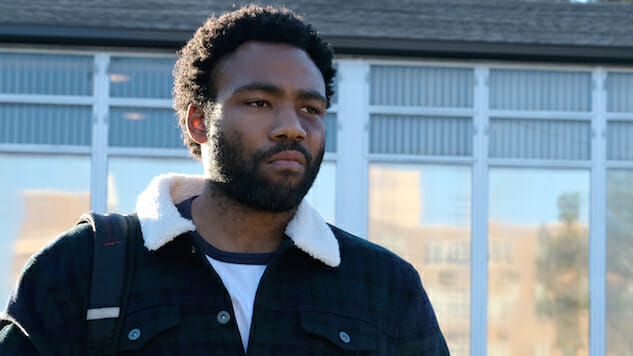Atlanta‘s Groundbreaking Robbin’ Season Comes to a Close on a More Straightforward Note
(Episode 2.11)
Photo: Curtis Baker/FX
The culmination of Donald Glover’s media empire didn’t necessarily have to coincide with the end of Atlanta’s second season, but it certainly helps drive some points home. After his music video for “This is America” smashed YouTube records, his SNL performance won praise, and he debuted in the biggest sci-fi franchise on the planet—all in the same week—ending Earn’s season arc might feel like a bit of an afterthought for the polymath. But with “Crabs in a Barrel,” Glover finds a throughline in his disparate interests and reckons with the systems he faced to succeed in each.
They’re all components of the entertainment industry. The stress, the silliness, the exploitation, and the rock-star feeling that’s too attractive to ignore. Atlanta, especially this Earn-centric episode, is two clenched fists and a popped forehead vein. Whether it’s the “religious” Lyft driver that refuses to listen to the GPS while she sings her gospel or the entertainment lawyer that came “highly recommended” but whose clients are disappointing one-hit wonders and reality TV stars, people seem disappointingly imperfect to a man that needs perfection to drag himself back up.
That’s because his client/cousin, Alfred (Brian Tyree Henry), is ready for the big leagues. He made a deal with the devil down in the forest and is willing to go the distance for his career, even if that means kissing fan ass. So now, on the precipice of a European tour with Clark County, bona fide Sad Boy Earn has to parent his daughter (which is the only time we see the poor guy smile in… maybe the whole season?) and two grown men (which is when we see him as stressed and depressed as he is the rest of the season) while wondering if he’s going to have a job once he crosses the Atlantic.
-

-

-

-

-

-

-

-

-

-

-

-

-

-

-

-

-

-

-

-

-

-

-

-

-

-

-

-

-

-

-

-

-

-

-

-

-

-

-

-








































